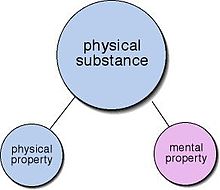
Property dualism describes a category of positions in the philosophy of mind which hold that, although the world is composed of just one kind of substance—the physical kind—there exist two distinct kinds of properties: physical properties and mental properties. In other words, it is the view that at least some non-physical, mental properties (such as thoughts, imagination and memories) exist in, or naturally supervene upon, certain physical substances (namely brains).
Substance dualism, on the other hand, is the view that there exist in the universe two fundamentally different kinds of substance: physical (matter) and non-physical (mind or consciousness), and subsequently also two kinds of properties which inhere in those respective substances. Both substance and property dualism are opposed to reductive physicalism. Notable proponents of property dualism include David Chalmers, Christof Koch and Richard Fumerton.[1][2][3] Epiphenomenalism is viewed as a form of property dualism.
- ^ Bratcher, Daniel (1999). "David Chalmers' Arguments for Property Dualism". Philosophy Today. 43 (3): 292–301. doi:10.5840/philtoday199943319.
- ^ Slagle, Jim (2015). "Knowledge, Thought, and the Case for Dualism". International Journal of Philosophical Studies. 23 (5): 776–779. doi:10.1080/09672559.2015.1099972.
- ^ Owen, Matthew (2018). "Dusting Off Dualism?". American Philosophical Association.
{{cite web}}: CS1 maint: url-status (link)